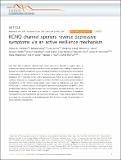KCNQ channel openers reverse depressive symptoms via an active resilience mechanism
Author(s)
Friedman, Allyson K.; Juarez, Barbara; Ku, Stacy M.; Zhang, Hongxing; Calizo, Rhodora C.; Walsh, Jessica J.; Chaudhury, Dipesh; Zhang, Song; Hawkins, Angel; Dietz, David M.; Murrough, James W.; Ribadeneira, Maria; Wong, Erik H.; Neve, Rachael L.; Han, Ming-Hu; ... Show more Show less
DownloadKCNQ channel openers.pdf (1.232Mb)
PUBLISHER_CC
Publisher with Creative Commons License
Creative Commons Attribution
Terms of use
Metadata
Show full item recordAbstract
Less than half of patients suffering from major depressive disorder, a leading cause of disability worldwide, achieve remission with current antidepressants, making it imperative to develop more effective treatment. A new therapeutic direction is emerging from the increased understanding of natural resilience as an active stress-coping process. It is known that potassium (K+) channels in the ventral tegmental area (VTA) are an active mediator of resilience. However, no druggable targets have been identified to potentiate active resilience mechanisms. In the chronic social defeat stress model of depression, we report that KCNQ-type K+ channel openers, including FDA-approved drug retigabine (ezogabine), show antidepressant efficacy. We demonstrate that overexpression of KCNQ channels in the VTA dopaminergic neurons and either local infusion or systemic administration of retigabine normalized neuronal hyperactivity and depressive behaviours. These findings identify KCNQ as a target for conceptually novel antidepressants that function through the potentiation of active resilience mechanisms.
Date issued
2016-05Department
Massachusetts Institute of Technology. Department of Brain and Cognitive Sciences; McGovern Institute for Brain Research at MITJournal
Nature Communications
Publisher
Springer Nature
Citation
Friedman, Allyson K., Barbara Juarez, Stacy M. Ku, Hongxing Zhang, Rhodora C. Calizo, Jessica J. Walsh, Dipesh Chaudhury, et al. “KCNQ Channel Openers Reverse Depressive Symptoms via an Active Resilience Mechanism.” Nat Comms 7 (May 24, 2016): 11671.
Version: Final published version
ISSN
2041-1723